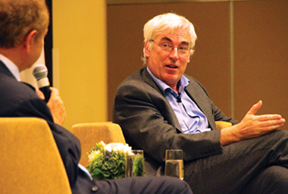By Jon Nalick
Owen Bennett-Jones, freelance British journalist and a host of “Newshour” on the BBC World Service, captivated audiences in Mayer Auditorium as he told tales of how local culture can shape — or sabotage — efforts to improve education and health worldwide.
He described how a leader in northwest Afghanistan shunned offers to build for free a school in his region, saying simply, “I don’t want it.” Later, while hunting with a would-be benefactor, the leader shot ducks that fell into a lake. He whistled and several men jumped into the water to retrieve them. The leader mused, “Do you honestly think they’d do that if they went to school?”
“And that is what you’re up against,” said Bennett-Jones: “Local elites who are quite determined to keep their people uneducated so they can hold on to the power that they’ve got.”

Journalist Owen Bennett-Jones (right) discusses his experiences in Pakistan and other nations with Keck School of Medicine Dean Carmen A. Puliafito during a Feb. 12 lecture at Mayer Auditorium.
Photo/Jon Nalick
He delivered his Feb. 12 lecture, “Global Health: A Journalist’s Perspective,” as part of the Distinguished Lecturer Series sponsored by Keck School of Medicine of USC Dean Carmen A. Puliafito, MD, MBA.
Bennett-Jones stressed the crucial importance of cultural awareness in the creation and administration of global health programs, and warned, “Sometimes what we do can be totally misinterpreted.”
He pointed to vaccination efforts in Pakistan that have been perceived locally as part of a nefarious U.S.-led plot to sterilize Muslims, noting that nurses and the police who protect them during vaccination efforts have been murdered in an effort to thwart the program.
He also warned that the mere presence of outsiders often alters local citizens’ behaviors in unpredictable ways. “We underestimate the extent that, just by being there, we change the situation,” said Bennett-Jones, offering a few examples. A calm demonstration in Peshawar might, with the introduction of a foreign news crew’s video camera, escalate rapidly into an anti-America riot with police responding with tear gas. Alternatively, if a journalist rides along with a police officer, it might inhibit the officer from accepting a motorist’s culturally acceptable bribe to settle a minor traffic violation — and result in the surprised motorist’s incarceration.
Still, he noted that cultural awareness can help people navigate the local environment and make great strides possible.
He cited the example of a public health program in Vietnam promoted by then-U.S. Ambassador Pete Peterson in the 1990s. Peterson, whose son died in a car crash, advocated for a program to require Vietnamese motorcyclists to wear helmets to reduce the high incidence of traffic fatalities and head injuries common at the time.
The Vietnamese saw Peterson’s passion as he gave out helmets and understood that the American was making a personal gesture as he ended his ambassadorial term. The program’s organizers, recognizing a cultural reluctance for individuals to stand out from the crowd, pushed to have everyone countrywide switch to wearing helmets simultaneously, Bennett-Jones said: “They did it, and it worked.”
Bennett-Jones concluded by emphasizing that without a deep cultural understanding of the local environment, outsiders can do as much harm as good. But, he said, with care and preparation, “sometimes you can get it right.”


